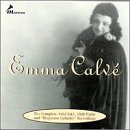| All Artists: Jules Massenet Title: Emma Calvé: The Complete 1902 G&T, 1920 Pathe and Mapleson Cylinder Recordings (with additional recordings by soprano Cecile Merguillier) Members Wishing: 0 Total Copies: 0 Label: Marston Release Date: 11/10/1998 Album Type: Original recording remastered Genres: Special Interest, Pop, Classical Styles: Vocal Pop, Opera & Classical Vocal, Historical Periods, Baroque (c.1600-1750), Classical (c.1770-1830), Early Music, Modern, 20th, & 21st Century Number of Discs: 2 SwapaCD Credits: 2 UPC: 638335201320 |
Search - Jules Massenet :: Emma Calvé: The Complete 1902 G&T, 1920 Pathe and Mapleson Cylinder Recordings (with additional recordings by soprano Cecile Merguillier)
 | Jules Massenet Emma Calvé: The Complete 1902 G&T, 1920 Pathe and Mapleson Cylinder Recordings (with additional recordings by soprano Cecile Merguillier) Genres: Special Interest, Pop, Classical
|
Larger Image |
CD Details |
CD ReviewsTHE INCOMPARABLE CALVE Paco Rivero | Miami, FL | 12/25/2009 (5 out of 5 stars) "Emma Calve was a phenomenon. Although recorded fairly late in her career, she is probably near her prime singing "Voi lo sapete" from "Cavalleria Rusticana." Her Spanish songs, as well as selections from "Carmen," are charmingly rendered with much joie de vivre. Her "L'Heure exquise" is truly exquisite, thanks to her infinitely delicate touch. Her voice becomes richly mournful intoning "In questa tomba oscura," while in "Casta Diva" she becomes a jealous, passionate Norma. In "Charmant oiseau," an ethereal conjunction of timbres is achieved between her voice and the birdlike flute. But I found her "Enchantement" less than enchanting, and in a few other instances her voice shows its age. The six songs in English are feelingly delivered, but made awkward by Calve's thick French accent.
Despite the rough quality of the source material, both the G&T and Pathe recordings manage to capture Calve's lightness of tone, which is most charming on the high notes. The Lionel Mapleson cylinders, recorded live at the Met in February of 1902, are gruelling to listen to. Nonetheless, particularly those from "Faust" prove that a marvelous instrument was gracing the stage of the Metropolitan Opera. They also indicate that her studio recordings, fantastic as they are, don't measure up to the Emma Calve we catch a glimpse of in these live performances. She almost literaly brings down the house. Despite the difficulty of listening to them (rather like music going in and out on a radio station whose signal you are losing), the Mapleson cylinders are worth careful attention. Mere aural smudges, they nonetheless prove that Calve's studio recordings don't do her justice. Also, don't be scared away by them, as they only make up a small part of what's on these two jam-packed CDs. Most of the other recordings are much better. Ward Marston is a wizard at tranferring the voices from old records. Careful not to over-engineer, he makes sure that the voices from the dawn of the last century sound as sensuous as possible. I just listened to Rosa Ponselle on a CD released by Prima Voce. They did a good job cleaning up the extraneous noise, but they also dulled her voice. By contrast, I'm always delighted by the rich, warm, scintillating tones that Marston uncovers, even if sometimes he leaves a lot more surface noise in the mix. Finally, as an added bonus, Marston gives us fifteen rollicking performances recorded for Thomas Edison by the lively French soprano Cecile Merguillier, a vocal acrobat if ever there was one. Her selection from Meyerbeer's "Le Pardon de Ploemel" is a showstopper. A great duet with Monsieur Gluck ends this marvelous two CD set." |

 Track Listings (24) - Disc #1
Track Listings (24) - Disc #1